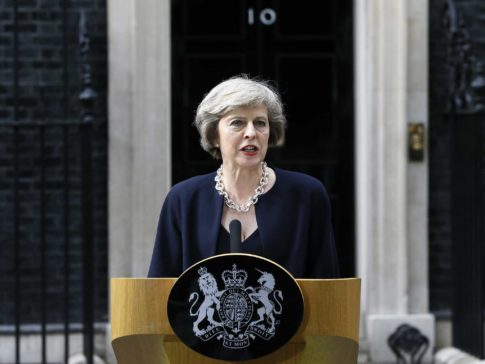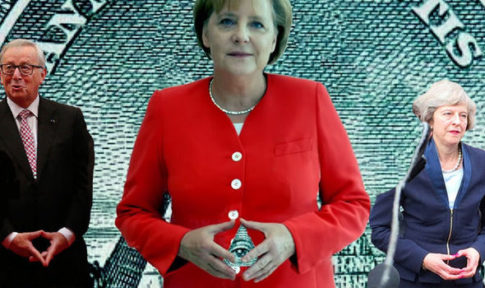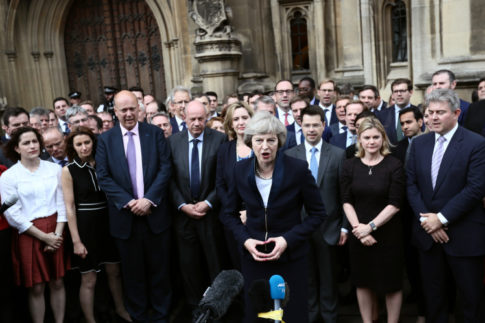– “The People Made Their Choice” – Theresa May Vows To Deliver “Full” EU Exit Despite Court Challenge:
In the aftermath of last week’s surprising decision by a UK High Court to force a parliamentary vote on Article 50, a hard – or even soft – Brexit suddenly has been put in question, having thrown the government’s plans to launch a two-year divorce process by the end of March into disarray, and sending the Pound soaring. So in her first public statement since the vote, British Prime Minister Theresa May, writing in the Sunday Telegraph, said she is confident of overturning the ruling and vowed that she would deliver a full exit from the European Union, hitting back at critics of her Brexit strategy who have threatened to try to block the process in parliament.
In her op-ed, May signaled she would resist any attempt to force her to change her approach to leaving the EU:
“The people made their choice, and did so decisively. It is the responsibility of the government to get on with the job and to carry out their instruction in full,” May wrote. She said members of parliament who regretted the referendum result “need to accept what the people decided”.
May’s government, which has provided little detail about its plans for Britain’s future relationship with the EU, has said that having to set out a detailed negotiating strategy to parliament would put it at a disadvantage in the talks. “While others seek to tie our negotiating hands, the Government will get on with the job of delivering the decision of the British people,” May said in a separate statement ahead of a trade visit to India on Sunday.
Meanwhile, the head of Britain’s opposition Labour Party, Jeremy Corbyn, said in a newspaper interview that he would try to block the commencement of divorce talks with the EU if the government does not agree to his Brexit demands.
Adding to the confusion, arch-eurosceptic and the man who led the UKIP’s successful Brexit campaign, Nigel Farage said there was a growing movement to keep Britain within the EU’s tariff-free single market – a scenario he called a “half-Brexit” that went against the referendum result.
“If the people in this country think that they’re going to be cheated, they’re going to be betrayed, then we will see political anger the likes of which none of us in our lifetimes have ever witnessed in this country,” he told the BBC. Echoing commentary from Deutsche Bank, Farage also told ITV that Theresa May should call an early general election to avoid a “betrayal” of the public over Brexit, Nigel Farage has told Good Morning Britain.
According to Reuters, parliament could in theory block Brexit because most members supported staying in the EU in June’s referendum. But many lawmakers have signalled they would be willing to reverse their position to reflect the referendum result. “I think it is highly unlikely that parliament would not, in the end, back a decision to trigger Article 50,” health minister Jeremy Hunt told the BBC, referring to the EU treaty mechanism for launching divorce proceedings.
However, in welcome news for pound bulls, last week’s court ruling could allow lawmakers to temper the government’s approach, however, making a “hard Brexit” – where tight controls on immigration are prioritised over remaining in the single market – less likely.
Corbyn also told the Sunday Mirror that Labour’s “Brexit bottom line” would require guarantees for access to the single market for exporters, continued protection of workers’ rights, safeguards for consumers and the environment, and pledges that Britain would make up any loss of EU capital investment. He said he would welcome an early national election if May refused to meet his demands. But the next one is not due until 2020, and the government has so far resisted pressure to dissolve parliament and seek a stronger mandate.
“I think a general election is frankly the last thing that the government wants .. It’s the last thing that the British people want,” Hunt said.
A government appeal against the High Court ruling is expected to be considered by Britain’s Supreme Court early next month. May has said she still plans to invoke Article 50 by the end of March.
“We need to turn our minds to how we get the best outcome for our country,” she said in the statement issued by her office. “That means sticking to our plan and timetable, getting on with the work of developing our negotiating strategy and not putting all our cards on the table – that is not in our national interest and it won’t help us get the best deal for Britain.”
And as the UK political chaos has returned, adding another variable for investors to contemplate in the coming months, the next big risk event on Europe’s horizon is the December 4 Italian referendum on amending the Italian Constitution, which according to journalist Alessandra Quattrocchi, will be primarily a moment of truth for Prime Minister Matteo Renzi.
She said that the referendum would be more about revealing the level of public support for Renzi, than about the constitutional reform itself. Many people will vote “No” because “they hope to oust Renzi from our government,” she said, adding that sending a message to Renzi is “the main reason why they are against it.”
So as a major page of political uncertainty closes in the US with Tuesday’s presidential election, it is set to once again reopen in Europe.
* * *
PayPal: Donate in USD
PayPal: Donate in EUR
PayPal: Donate in GBP


